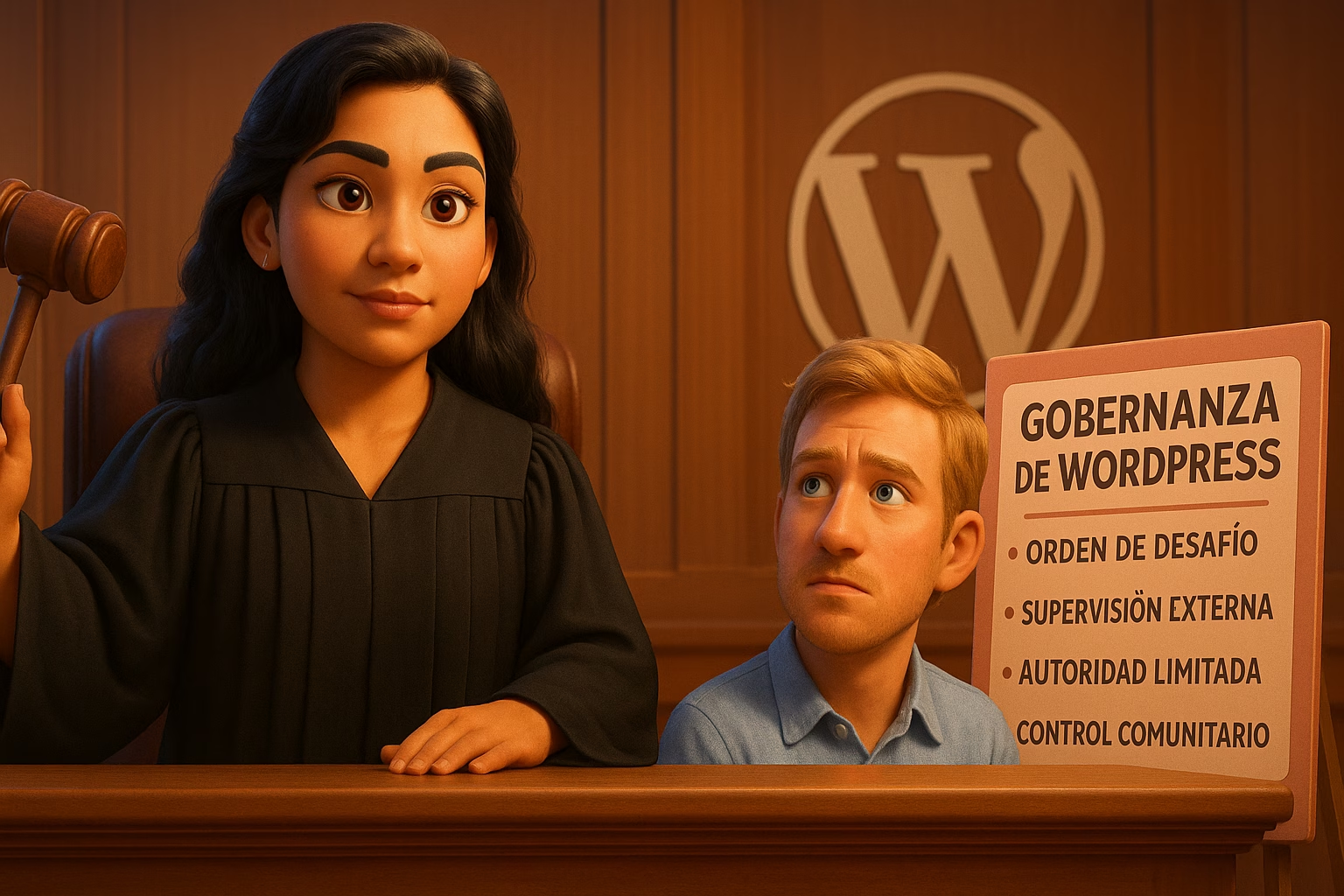El pasado 30 de abril de 2025 se dictó una parte de sentencia sobre el caso contra Automattic y Matt Mullenweg. No es la sentencia completa de todo, pero sí una parte de ella teniendo en cuenta la situación.
Al final dejo el texto y PDF para su lectura, pero quiero ir comentando cada uno de los partes de esto, y su relación con que se haya devuelto el acceso a todo el mundo que se había bloqueado desde agosto de 2024 en adelante.
Como detalle, he de recordar que yo fui una de esas personas que fueron bloqueadas durante ese tiempo, por una conversación con Matt en la que comentábamos sobre el «checkbox» de la afiliación con WPEngine (que se comenta, precisamente, en esta sentencia).
Otra nota: Mis conocimientos, por muchas series de jueces que haya visto de USA, son limitados en cuanto a sentencias en USA. Pero vamos, no deja de ser significativo lo que se plantea.
La sentencia
The Court, having considered Non-Party Michael Willman’s Motion for Contempt, the accompanying memorandum of points and authorities, the declaration(s) filed in support, and the arguments presented, hereby ORDERS as follows:
- FINDINGS OF FACT
- The Court finds that Defendant Matt Mullenweg and Automattic Inc. have willfully violated the preliminary injunction issued on December 10, 2024.
- The Court finds that Defendants’ actions, including banning Michael Willman from the Make.WordPress.org Slack workspace, constitute interference with access to WordPress.org resources as prohibited by the preliminary injunction.
- The Court, having reviewed the conduct of the Defendant as detailed in the accompanying motion, finds that there is a prima facie basis to believe that the Defendant has engaged in willful conduct that may constitute criminal contempt under 18 U.S.C. § 401 and/or Rule 42 of the Federal Rules of Criminal Procedure.
- The Court further finds that Defendants’ conduct was retaliatory, causing significant harm to Mr. Willman and his business operations.
Contexto del Caso
WP Engine, una empresa de alojamiento especializada en WordPress, demandó a Automattic y a su CEO, Matt Mullenweg, en octubre de 2024. La demanda alega abuso de poder, extorsión y difamación por parte de Mullenweg, quien acusó públicamente a WP Engine de ser un «cáncer para WordPress» y bloqueó su acceso a recursos esenciales en WordPress.org, incluyendo el control sobre el plugin Advanced Custom Fields (ACF) (The Verge).
En diciembre de 2024, la jueza Araceli Martínez-Olguín del Tribunal del Distrito Norte de California concedió una orden judicial preliminar a favor de WP Engine. La orden requería que Automattic y Mullenweg restauraran el acceso de WP Engine a WordPress.org y cesaran cualquier interferencia con sus plugins y operaciones .(wptavern.com, therepository.email)
Moción por desacato de Michael Willman
Michael Willman, desarrollador y CEO de Website Redevelopment Corporation, presentó una moción por desacato alegando que Automattic y Mullenweg violaron intencionalmente la orden judicial al prohibirle el acceso al espacio de trabajo de Slack de Make.WordPress.org el 4 de enero de 2025. Willman argumenta que esta acción interfirió con su acceso a recursos esenciales y perjudicó sus relaciones comerciales (therepository.email).
La corte encontró:
- Automattic y Mullenweg violaron deliberadamente la orden judicial preliminar.
- La prohibición a Willman constituyó una interferencia con el acceso a recursos de WordPress.org, prohibida por la orden judicial.
- Existe una base prima facie para creer que los acusados incurrieron en desacato criminal según 18 U.S.C. § 401 y/o la Regla 42 de las Reglas Federales de Procedimiento Penal.
- Las acciones de los acusados fueron retaliatorias, causando un daño significativo a Willman y sus operaciones comerciales.
Implicaciones
Este caso ha generado un debate sobre la gobernanza de WordPress y el poder que ejerce Automattic sobre la comunidad. La moción de Willman resalta preocupaciones sobre posibles abusos de autoridad y la necesidad de una supervisión más independiente en la gestión de WordPress.org (WinBuzzer).
- CONTEMPT RULING
- Defendants Matt Mullenweg and Automattic, Inc are hereby held in civil contempt for their failure to comply with the Court’s preliminary injunction.
- The Court refers Defendant Matt Mullenweg to the United States Attorney for the Northern District of California for further investigation and, if appropriate, prosecution for criminal contempt of court. The Clerk of the Court is directed to transmit a copy of this Order, together with the relevant pleadings and record excerpts, to the United States Attorney’s Office.
CONTEMPT RULING (Resolución por Desacato)
Punto 1: Desacato Civil
- La corte declara que Mullenweg y Automattic están en desacato civil.
- Esto significa que violaron intencionalmente la orden judicial emitida en diciembre de 2024, que les obligaba a cesar interferencias y restaurar accesos a WordPress.org.
- El desacato civil no es penal (aún), pero permite al tribunal imponer sanciones (multas, coerción, etc.) para forzar el cumplimiento de la orden y compensar daños.
Punto 2: Referencia por Desacato Criminal
- La jueza remite a Matt Mullenweg al fiscal federal del Distrito Norte de California.
- ¿Por qué? Porque su conducta podría no solo violar una orden, sino constituir un crimen federal, bajo 18 U.S.C. § 401 (desacato criminal).
- Esto va más allá del desacato civil: implica una posible acusación penal, sancionable con multa o prisión.
- La Secretaría del Tribunal debe enviar el expediente completo al fiscal para que evalúe si se presenta una denuncia penal formal.
Implicaciones
- Esta es una escalada significativa del caso: pasar de lo civil a lo criminal implica que la corte considera que el comportamiento de Mullenweg fue intencional, grave y perjudicial para el sistema judicial.
- Si el fiscal procede, Mullenweg podría enfrentar cargos penales, lo cual es extremadamente raro en disputas sobre software libre y comunidad.
- Legalmente, esto también refuerza la posición de WP Engine y de terceros como Michael Willman, que alegan represalias dentro del ecosistema WordPress.
- RELIEF GRANTED
- Defendants are ordered to immediately restore Mr. Willman’s access to the Make.WordPress.org Slack workspace and any other WordPress.org-related resources necessary for his business operations.
- Defendants are directed to cease any further retaliatory conduct against Mr. Willman.
- Defendants shall pay compensatory sanctions to Mr. Willman in an amount deemed appropriate by the Court, reflecting the harm caused by Defendants’ willful violation of the preliminary injunction. While the precise financial impact of Defendants’ actions is challenging to quantify directly, the harm includes disruption to Mr. Willman’s professional activities, interference with his ability to serve as a community moderator, and reputational harm caused by retaliatory conduct.
- To ensure compliance, Defendants are subject to the following coercive measures:
a. A coercive fine of an amount to be determined by the court for each day they fail to comply with this Order.
b. Incarceration of Defendant Matt Mullenweg until such time as he brings the operations of Automattic, Inc; WordPress.org; the WordPress open source project; and the WordPress Foundation in line with the terms of the existing preliminary injunction.
RELIEF GRANTED (medidas otorgadas)
Esta sección detalla qué debe hacer Matt Mullenweg y Automattic como consecuencia del desacato y de las acciones que afectaron a Michael Willman.
Punto 1: Restauración inmediata de acceso
- Automattic y Mullenweg deben restablecer de forma inmediata el acceso de Michael Willman a:
- El Slack de Make.WordPress.org.
- Cualquier otro recurso ligado a WordPress.org que sea esencial para sus operaciones comerciales.
- Esto apunta directamente al uso de plataformas comunitarias y de desarrollo abiertas, que fueron restringidas.
Punto 2: Prohibición de represalias
- La Corte prohíbe a Automattic y Mullenweg tomar nuevas represalias contra Willman.
- Esto cubre tanto actos directos como indirectos que puedan perjudicarle a nivel profesional o personal dentro de la comunidad WordPress.
Punto 3: Sanciones compensatorias
- El tribunal ordena el pago de sanciones económicas compensatorias a Willman.
- Aunque no se ha determinado aún la cantidad exacta, se reconoce que:
- Hubo una interrupción de su actividad profesional.
- Se interfirió con su papel como moderador comunitario.
- Se produjo un daño reputacional como resultado de represalias.
Esto valida que los daños no son simbólicos, sino económicos, profesionales y personales.
Punto 4: Medidas coercitivas
- Multa diaria: Se impondrá una sanción económica por cada día que los demandados no cumplan con esta orden.
- Prisión preventiva para Mullenweg:
Si no cumple con la orden, podría ser encarcelado hasta que:- Automattic, Inc.
- WordPress.org
- El proyecto código abierto WordPress
- La WordPress Foundation
se alineen con los términos de la orden judicial preliminar.
Esto es extremadamente severo: habla no solo de desacato personal, sino de una exigencia de reformar estructuralmente todo el ecosistema institucional bajo su control.
Conclusión de esta sección
Esta resolución judicial no es común en casos relacionados con software libre o plataformas colaborativas. Aquí el tribunal:
- Actúa con dureza ante la obstrucción y el abuso de poder en un proyecto de código abierto.
- Muestra que la ley también aplica en entornos comunitarios digitales, incluso si hay estructuras híbridas como fundaciones + empresas privadas (Automattic).
- Eleva la presión legal hasta niveles que pueden cambiar cómo se gestiona WordPress.org, o incluso provocar una separación entre WordPress y Automattic en términos de gobernanza.
- FUTURE CONDUCT
- The Court further orders that Defendant Matt Mullenweg be restricted from taking any further actions in his capacity as Director of the WordPress Foundation that may interfere with the operations of WordPress.org or its affiliated platforms, including but not limited to: retaliatory measures against Mr. Willman and other individuals associated with WP Engine or its affiliates; retaliatory measures against individuals who utilize WordPress.org services such as the Make. WordPress.org slack to post messages critical of Matt Mullenweg or Automattic; posting personal blog messages written by or on the direction of Matt Mullenweg to the WordPress.org News section; causing personal blog messages written by or on the direction of Matt Mullenweg to be delivered to the WordPress admin panel of any customer, user, affiliate or partner of WP Engine; delaying or pausing the release of future versions of WordPress.
- To ensure accountability and prevent further misuse of authority, the Court orders the establishment of a «WordPress Governance Oversight Board» to oversee the governance of the WordPress Foundation, WordPress.org, and related entities and subdomains. The Board shall consist of the following seven individuals, chosen in part due to Defendants own retaliatory actions against them
a. Michael Willman (representing himself as an injured party, and a class of customers, users, affiliates and partners of WP Engine)
b. A representative selected by WP Engine (representing themselves as an injured party, and a class of commercial WordPress hosting providers)
c. A representative selected by the WordPress Community Team (by majority vote of the current members of the Community Team)
d. A representative selected by the WordPress Incident Response Team (by majority vote of the current members of the Incident Response Team)
e. Amber Hinds (representing a class of commercial plugin and theme developers)
f. John Blackbourn (representing a class of commercial web development agencies)
g. Sé Reed (representing the larger WordPress community and the WP Community Collective).- The WordPress Governance Oversight Board shall have oversight authority over major and minor WordPress releases and ensure that future releases cannot be used as a method of retaliation. Upon the granting of this Order, the release coordinators for major release 6.8 (Jeff Paul and Michelle Frechette) shall nominate a release lead for the subsequent major release.
The Board shall hold a vote to confirm or reject the nominee by majority consent. If the Board rejects the initial nominee, the current release coordinators may propose a second candidate. If both nominees are rejected, the Board shall appoint a release lead by majority vote. All future release leads shall appoint their successor using this same method. No release lead may lead more than one major release in a 12 month period.- All other minor releases and other governance decisions made by the WordPress Foundation, or by Matt Mullenweg in his role as director of the WordPress Foundation and the owner of WordPress.org, shall continue unaltered, EXCEPT THAT:
a. Any Governance Oversight Board member may call for a vote to approve, deny, or roll back a minor release. The board must then cast votes within 7 business days on whether the release is to be rolled back, approved or denied.
b. Any Governance Oversight Board member may call for a vote of no-confidence for any release lead, team lead, or other individual in a leadership role within the WordPress project, WordPress.org, or the WordPress Foundation, on the grounds that their actions are in violation of the preliminary injunction against Matt Mullenweg and Automattic. The board must then cast votes within 7 business days on whether the individual is to be censured. Upon successful censure, the individual shall be enjoined from resuming a leadership role in the WordPress project until the censure vote is overturned or the Governance Oversight Board is disbanded.
c. All major release leads must have prior experience leading at least one minor release, or significant comparable leadership experience in the Make. WordPress.org community. Any appointees selected by the Governance Oversight Board to any leadership position, must be a Core Contributor or a Contributor in another team that is related to the position. In extenuating circumstances, the Governance Oversight Board may appoint an individual that does not comply with these standards, upon a two thirds majority vote by the board.
d. The Governance Oversight Board may not call for a vote of no-confidence against or otherwise prevent Matt Mullenweg from performing his duties as Director of the WordPress Foundation and owner of WordPress.org.
e. No member of the Governance Oversight Board may be nominated or appointed to any leadership position in the WordPress Foundation or WordPress.org, unless it involves renomination or reappointment to the Governance Oversight Board.
f. If a member of the Governance Oversight Board steps down from their position, a new representative may be appointed by the individual or group originally empowered to choose a representative. Alternatively, the Governance Oversight Board may invite a relevant trade organization or non-profit to appoint a representative to fill a seat that is not filled within 30 days. If no relevant trade organization or non-profit is willing and able, then the Governance Oversight Board may appoint a new member upon majority consent.
g. Matt Mullenweg and other employees of Automattic, Inc; the WordPress Foundation; Audrey Capital; and WordPress.org may not appoint or nominate new members to the Incident Response Team or Community Team. All appointments to these teams must follow procedures in place on or before the date that this order was filed.
h. Any named individual or active representative serving on the board, may appoint an alternate representative in their stead, without the prior consent of the board. This does not apply to elected members of the Incident Response Team or Community Team.- Past and current employees of: Automattic, Inc, the WordPress Foundation, Audrey Capital, WordPress.org, WP Engine, and Redev; who are currently employed or have been employed within the last 12 months, are excluded from participating in any votes by the WordPress Incident Response Team and WordPress Community Team.
- The Governance Oversight Board shall exist solely for the purpose of maintaining stability in the open-source WordPress project and to prevent further retaliation against members of the WordPress community. Membership on the Governance Oversight Board may not be used to attempt to make structural changes to the technical foundation of WordPress, generate a profit or convert public assets to personal use, retaliate against Matt Mullenweg or Automattic, Inc., or otherwise significantly transform the nature of the WordPress open source software, the WordPress project, the WordPress Foundation, or WordPress.org.
- The Board shall remain in existence through the date on which judgment is entered following the trial of this action.
- The Court reserves the right to impose additional sanctions, including but not limited to further monetary and non-monetary penalties, should additional violations of the Court’s orders occur.
FUTURE CONDUCT (conducta futura)
Objetivo principal
Establecer limitaciones permanentes al poder de Matt Mullenweg y crear un sistema de gobernanza supervisado externamente para WordPress.org, la WordPress Foundation y sus entidades relacionadas, con el fin de proteger a la comunidad de represalias o abuso de autoridad.
Punto 1: Restricciones sobre Mullenweg
- Tomar represalias contra Willman o cualquier persona vinculada a WP Engine.
- Actuar contra quienes critiquen a Automattic o a él mismo en el Slack de Make.WordPress.org.
- Publicar mensajes personales en el blog oficial de WordPress.org o enviarlos al panel de administración de WordPress de los usuarios.
- Retrasar o pausar lanzamientos de futuras versiones de WordPress.
Esto restringe su influencia directa sobre la comunidad y la infraestructura de comunicación.
Punto 2: Creación del «WordPress Governance Oversight Board»
- Michael Willman, como parte perjudicada.
- Representante de WP Engine.
- Miembro elegido del WordPress Community Team.
- Miembro elegido del Incident Response Team.
- Amber Hinds, en nombre de desarrolladores comerciales.
- John Blackbourn, en nombre de agencias de desarrollo.
- Sé Reed, en representación de la comunidad más amplia.
Esta Junta tiene el poder de supervisar las decisiones de gobernanza, y representa un giro estructural sin precedentes en la historia de WordPress.
Punto 3: Supervisión de lanzamientos de WordPress
- El WordPress Governance Oversight Board supervisará todos los lanzamientos (mayores y menores).
- El equipo actual de coordinadores de la versión 6.8 deberá nominar al líder para la siguiente gran versión, sujeto a aprobación del Board.
- Ningún líder de versión puede liderar más de una versión mayor al año.
- Si el Board rechaza dos candidatos, nombrará directamente a uno.
Esto corta el control unilateral sobre el ciclo de lanzamientos y fuerza una gobernanza distribuida.
Punto 4: Control sobre otras decisiones de gobernanza
- Cualquier miembro del Board puede:
- Solicitar votación para aprobar/revertir lanzamientos menores.
- Proponer una moción de censura contra cualquier líder del proyecto si viola las órdenes judiciales.
- Cualquier líder censurado queda inhabilitado para ocupar cargos hasta que se revoque la censura.
- Líderes de versiones mayores deben tener experiencia mínima demostrable.
- Matt Mullenweg no puede ser censurado ni removido de sus funciones como director.
- Los miembros del Board no pueden asumir cargos en WordPress.org o en la Fundación, salvo que se trate de su propia reelección.
- El Board puede reemplazar miembros con aprobación del grupo correspondiente o mediante invitación a entidades sin ánimo de lucro.
- Mullenweg y empleados de Automattic pierden el derecho a nombrar miembros en el Community Team o Incident Response Team.
Punto 5: Exclusión de votaciones
- Empleados actuales o recientes (últimos 12 meses) de:
- Automattic, WordPress Foundation, Audrey Capital, WordPress.org
- WP Engine y Redev
no pueden participar en votaciones de los equipos comunitarios.
Punto 6: Propósito limitado del Board
El Board existe únicamente para estabilizar el proyecto código abierto, no para:
- Cambiar la arquitectura técnica de WordPress.
- Generar ganancias.
- Convertir activos públicos en uso personal.
- Tomar represalias contra Mullenweg o Automattic.
- Reestructurar significativamente WordPress.
Punto 7: Duración
- El Board existirá hasta que finalice el juicio principal del caso WP Engine v. Automattic.
Punto 8: Sanciones futuras
- El tribunal se reserva el derecho de imponer más sanciones (económicas o no) si se detectan nuevas violaciones a las órdenes.
Conclusión general de esta sección
Esta parte representa un cambio radical e histórico en cómo se gestiona WordPress:
- Por primera vez, se limita legalmente el poder de Matt Mullenweg sobre su ecosistema.
- Se introduce un modelo de supervisión externo, comunitario y judicialmente aprobado, algo sin precedentes en un proyecto código abierto de esta magnitud.
- Se reconoce legalmente que WordPress.org y sus herramientas no son solo parte de una comunidad voluntaria, sino también infraestructura crítica para negocios globales, y deben tratarse con responsabilidad institucional.
¿Qué significa esta sentencia para la Comunidad WordPress?
Una ruptura del mito del “benevolent dictator”
Hasta ahora, Matt Mullenweg ha sido considerado el “líder benevolente” del ecosistema WordPress: fundador, ideólogo y director de facto del proyecto. Esta sentencia rompe ese paradigma, al establecer legalmente que:
- Su poder tiene límites.
- Puede ser abusivo.
- Y debe rendir cuentas.
Esto no solo afecta a Mullenweg personalmente, sino que cuestiona todo el modelo de gobernanza centralizada que WordPress ha tenido desde su inicio.
Intervención judicial directa en un proyecto código abierto
Este es uno de los primeros casos conocidos en el que una corte de EE.UU. interviene directamente en la estructura de gobernanza de un proyecto open source global.
Se ha obligado legalmente a:
- Reinstalar a un miembro expulsado.
- Pagar sanciones.
- Evitar represalias futuras.
- Crear un nuevo órgano de supervisión.
- Restringir el control de lanzamientos.
La consecuencia es que la gestión de WordPress ya no es solo una cuestión interna de comunidad o empresa, sino que ahora está bajo supervisión legal.
Creación de un organismo externo de control
La sentencia ordena la creación del WordPress Governance Oversight Board, con poder de veto sobre lanzamientos, censura de líderes y fiscalización de decisiones.
Este organismo:
- Está compuesto por miembros ajenos a Automattic.
- Representa usuarios, desarrolladores, empresas y la comunidad.
- Limita el poder de Matt Mullenweg, pero no lo elimina.
Esto establece un modelo mixto de gobernanza, algo similar a lo que ocurre en fundaciones como Mozilla o Apache, pero por orden judicial, no por consenso comunitario.
Precedente para otras comunidades código abierto
Este caso se convierte en un precedente legal y cultural para otras comunidades FOSS (Free and Open Source Software):
- Sí se puede demandar abuso de poder dentro de una comunidad código abierto.
- Sí se puede conseguir intervención judicial cuando hay daños reputacionales, comerciales o técnicos.
- Sí se puede forzar cambios estructurales para evitar centralización dañina.
Esto puede inspirar cambios (o demandas similares) en proyectos como Drupal, Joomla, incluso NPM o GitHub si se dieran situaciones análogas.
Desconfianza en la neutralidad de WordPress.org
La sentencia muestra con claridad que:
- WordPress.org no es independiente de Automattic o de Mullenweg.
- Las herramientas como el Slack, los blogs, y hasta el panel de administración de WordPress pueden usarse como instrumentos políticos o comerciales.
Este juicio da argumentos fuertes a quienes han pedido desde hace años descentralizar la gestión de los recursos comunitarios y separar los intereses de Automattic del proyecto WordPress en sí.
Posible reconfiguración futura del ecosistema
Esta sentencia puede desencadenar:
- Un rediseño del sistema de gobernanza en el core del proyecto.
- La aparición de nuevas plataformas que clonen WordPress con gobernanza alternativa (forks sociales).
- Una mayor presión para convertir a WordPress.org en una verdadera fundación neutral, separada de Automattic.
También habrá mayor escrutinio por parte de desarrolladores, empresas y gobiernos sobre cómo se gestionan las decisiones en WordPress.
No es sólo un juicio, es un punto de inflexión
Esta sentencia marca un antes y un después en la historia de WordPress.
- Ya no es solo “el CMS más usado del mundo”.
- Es un proyecto cuya gobernanza ha sido judicialmente intervenida por falta de neutralidad, abuso de poder y represalias contra miembros clave.
La comunidad, los colaboradores y las empresas que dependen de WordPress tienen ahora más razones que nunca para exigir transparencia, participación real y un futuro menos controlado por una sola persona o empresa.
Sentencia completa y descarga
The Court, having considered Non-Party Michael Willman’s Motion for Contempt, the accompanying memorandum of points and authorities, the declaration(s) filed in support, and the arguments presented, hereby ORDERS as follows:
1. FINDINGS OF FACT
1. The Court finds that Defendant Matt Mullenweg and Automattic Inc. have willfully violated the preliminary injunction issued on December 10, 2024.
2. The Court finds that Defendants’ actions, including banning Michael Willman from the Make.WordPress.org Slack workspace, constitute interference with access to WordPress.org resources as prohibited by the preliminary injunction.
3. The Court, having reviewed the conduct of the Defendant as detailed in the accompanying motion, finds that there is a prima facie basis to believe that the Defendant has engaged in willful conduct that may constitute criminal contempt under 18 U.S.C. § 401 and/or Rule 42 of the Federal Rules of Criminal Procedure.
4. The Court further finds that Defendants’ conduct was retaliatory, causing significant harm to Mr. Willman and his business operations.
2. CONTEMPT RULING
1. Defendants Matt Mullenweg and Automattic, Inc are hereby held in civil contempt for their failure to comply with the Court’s preliminary injunction.
2. The Court refers Defendant Matt Mullenweg to the United States Attorney for the Northern District of California for further investigation and, if appropriate, prosecution for criminal contempt of court. The Clerk of the Court is directed to transmit a copy of this Order, together with the relevant pleadings and record excerpts, to the United States Attorney’s Office.
3. RELIEF GRANTED
1. Defendants are ordered to immediately restore Mr. Willman’s access to the Make.WordPress.org Slack workspace and any other WordPress.org-related resources necessary for his business operations.
2. Defendants are directed to cease any further retaliatory conduct against Mr. Willman.
3. Defendants shall pay compensatory sanctions to Mr. Willman in an amount deemed appropriate by the Court, reflecting the harm caused by Defendants’ willful violation of the preliminary injunction. While the precise financial impact of Defendants’ actions is challenging to quantify directly, the harm includes disruption to Mr. Willman’s professional activities, interference with his ability to serve as a community moderator, and reputational harm caused by retaliatory conduct.
4. To ensure compliance, Defendants are subject to the following coercive measures:
a. A coercive fine of an amount to be determined by the court for each day they fail to comply with this Order.
b. Incarceration of Defendant Matt Mullenweg until such time as he brings the operations of Automattic, Inc; WordPress.org; the WordPress open source project; and the WordPress Foundation in line with the terms of the existing preliminary injunction.
4. FUTURE CONDUCT
1. The Court further orders that Defendant Matt Mullenweg be restricted from taking any further actions in his capacity as Director of the WordPress Foundation that may interfere with the operations of WordPress.org or its affiliated platforms, including but not limited to: retaliatory measures against Mr. Willman and other individuals associated with WP Engine or its affiliates; retaliatory measures against individuals who utilize WordPress.org services such as the Make. WordPress.org slack to post messages critical of Matt Mullenweg or Automattic; posting personal blog messages written by or on the direction of Matt Mullenweg to the WordPress.org News section; causing personal blog messages written by or on the direction of Matt Mullenweg to be delivered to the WordPress admin panel of any customer, user, affiliate or partner of WP Engine; delaying or pausing the release of future versions of WordPress.
2. To ensure accountability and prevent further misuse of authority, the Court orders the establishment of a «WordPress Governance Oversight Board» to oversee the governance of the WordPress Foundation, WordPress.org, and related entities and subdomains. The Board shall consist of the following seven individuals, chosen in part due to Defendants own retaliatory actions against them
a. Michael Willman (representing himself as an injured party, and a class of customers, users, affiliates and partners of WP Engine)
b. A representative selected by WP Engine (representing themselves as an injured party, and a class of commercial WordPress hosting providers)
c. A representative selected by the WordPress Community Team (by majority vote of the current members of the Community Team)
d. A representative selected by the WordPress Incident Response Team (by majority vote of the current members of the Incident Response Team)
e. Amber Hinds (representing a class of commercial plugin and theme developers)
f. John Blackbourn (representing a class of commercial web development agencies)
g. Sé Reed (representing the larger WordPress community and the WP Community Collective).
3. The WordPress Governance Oversight Board shall have oversight authority over major and minor WordPress releases and ensure that future releases cannot be used as a method of retaliation. Upon the granting of this Order, the release coordinators for major release 6.8 (Jeff Paul and Michelle Frechette) shall nominate a release lead for the subsequent major release.
The Board shall hold a vote to confirm or reject the nominee by majority consent. If the Board rejects the initial nominee, the current release coordinators may propose a second candidate. If both nominees are rejected, the Board shall appoint a release lead by majority vote. All future release leads shall appoint their successor using this same method. No release lead may lead more than one major release in a 12 month period.
4. All other minor releases and other governance decisions made by the WordPress Foundation, or by Matt Mullenweg in his role as director of the WordPress Foundation and the owner of WordPress.org, shall continue unaltered, EXCEPT THAT:
a. Any Governance Oversight Board member may call for a vote to approve, deny, or roll back a minor release. The board must then cast votes within 7 business days on whether the release is to be rolled back, approved or denied.
b. Any Governance Oversight Board member may call for a vote of no-confidence for any release lead, team lead, or other individual in a leadership role within the WordPress project, WordPress.org, or the WordPress Foundation, on the grounds that their actions are in violation of the preliminary injunction against Matt Mullenweg and Automattic. The board must then cast votes within 7 business days on whether the individual is to be censured. Upon successful censure, the individual shall be enjoined from resuming a leadership role in the WordPress project until the censure vote is overturned or the Governance Oversight Board is disbanded.
c. All major release leads must have prior experience leading at least one minor release, or significant comparable leadership experience in the Make. WordPress.org community. Any appointees selected by the Governance Oversight Board to any leadership position, must be a Core Contributor or a Contributor in another team that is related to the position. In extenuating circumstances, the Governance Oversight Board may appoint an individual that does not comply with these standards, upon a two thirds majority vote by the board.
d. The Governance Oversight Board may not call for a vote of no-confidence against or otherwise prevent Matt Mullenweg from performing his duties as Director of the WordPress Foundation and owner of WordPress.org.
e. No member of the Governance Oversight Board may be nominated or appointed to any leadership position in the WordPress Foundation or WordPress.org, unless it involves renomination or reappointment to the Governance Oversight Board.
f. If a member of the Governance Oversight Board steps down from their position, a new representative may be appointed by the individual or group originally empowered to choose a representative. Alternatively, the Governance Oversight Board may invite a relevant trade organization or non-profit to appoint a representative to fill a seat that is not filled within 30 days. If no relevant trade organization or non-profit is willing and able, then the Governance Oversight Board may appoint a new member upon majority consent.
g. Matt Mullenweg and other employees of Automattic, Inc; the WordPress Foundation; Audrey Capital; and WordPress.org may not appoint or nominate new members to the Incident Response Team or Community Team. All appointments to these teams must follow procedures in place on or before the date that this order was filed.
h. Any named individual or active representative serving on the board, may appoint an alternate representative in their stead, without the prior consent of the board. This does not apply to elected members of the Incident Response Team or Community Team.
5. Past and current employees of: Automattic, Inc, the WordPress Foundation, Audrey Capital, WordPress.org, WP Engine, and Redev; who are currently employed or have been employed within the last 12 months, are excluded from participating in any votes by the WordPress Incident Response Team and WordPress Community Team.
6. The Governance Oversight Board shall exist solely for the purpose of maintaining stability in the open-source WordPress project and to prevent further retaliation against members of the WordPress community. Membership on the Governance Oversight Board may not be used to attempt to make structural changes to the technical foundation of WordPress, generate a profit or convert public assets to personal use, retaliate against Matt Mullenweg or Automattic, Inc., or otherwise significantly transform the nature of the WordPress open source software, the WordPress project, the WordPress Foundation, or WordPress.org.
7. The Board shall remain in existence through the date on which judgment is entered following the trial of this action.
8. The Court reserves the right to impose additional sanctions, including but not limited to further monetary and non-monetary penalties, should additional violations of the Court’s orders occur.
The Honorable Araceli Martínez-Olguín
UNITED STATES DISTRICT JUDGE






Deja una respuesta